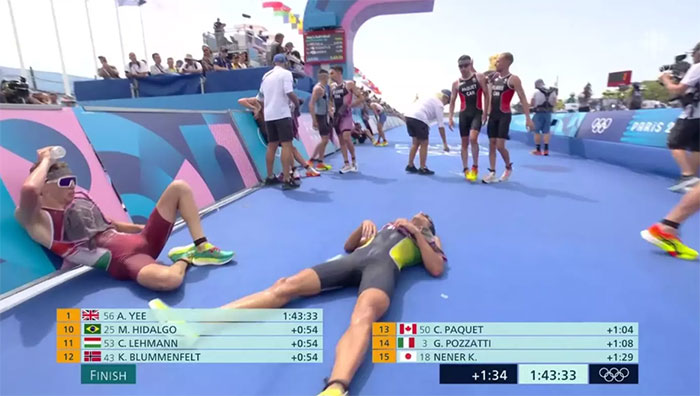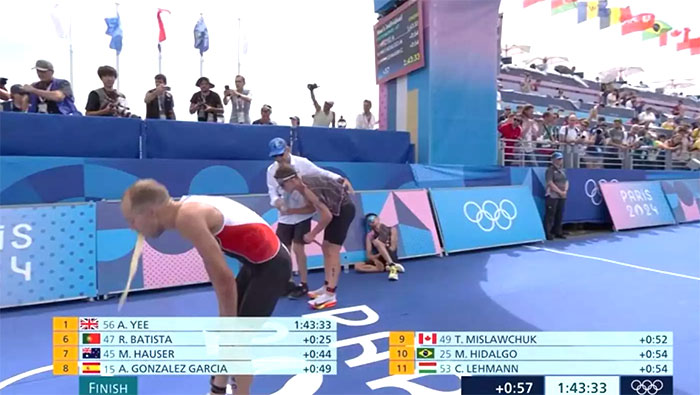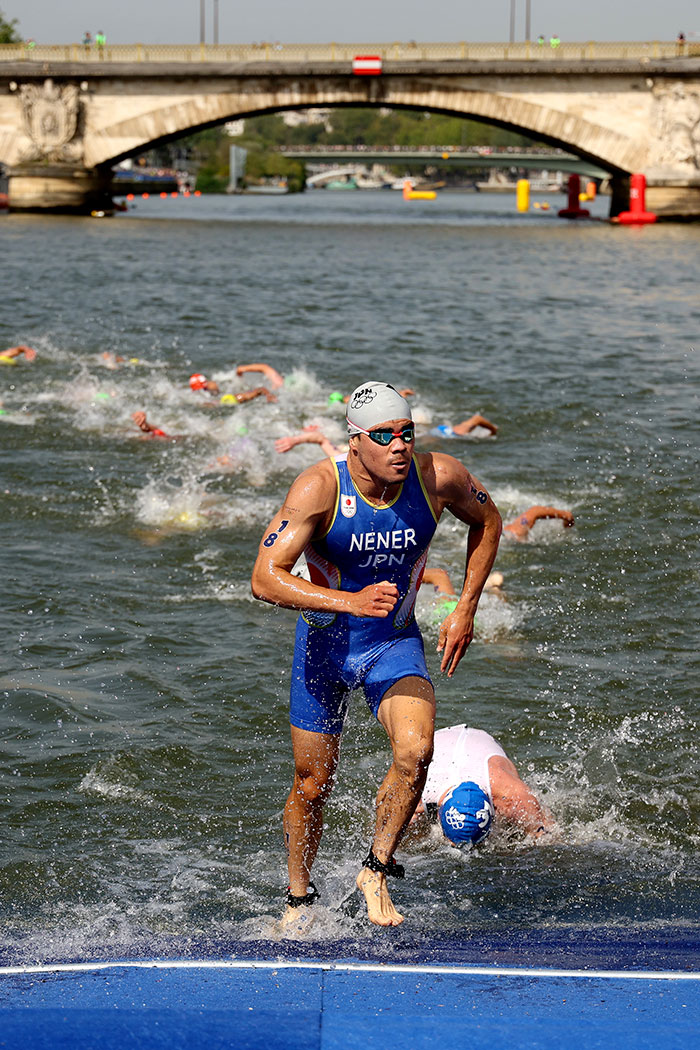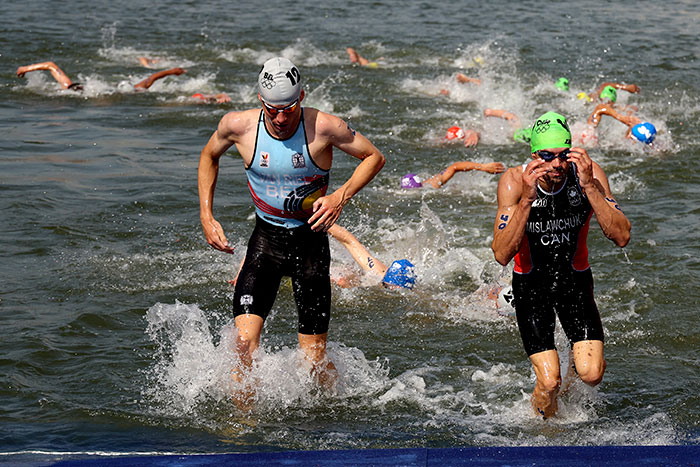Would you swim through possibly disease-infested waters in exchange for a shot at winning a medal? That is what triathlon star Tyler Mislawchuk was forced to do on July 31, 2024, when, in order to reach his goal, he had to swim a mile through the River Seine for his performance at the 2024 Paris Olympics.
The Canadian star finished in ninth place and, upon crossing the finish line, started throwing his guts up due to a combination of hot temperatures and the quality of the water.
Highlights
Canadian triathlon star Tyler Mislawchuk was seen throwing up violently after arriving at ninth place in the competition.
The Seine River has been closed off for more than a century due to health concern related to its polluted waters.
Paris has invested $1.5 billon dollars as part of a project to make the river “swimmable” for both athletes and citizens.
The river was subject to numerous procedures costing upwards of $1.5 billion in order to make it apt for the competitors. However, the measures were believed by many to be insufficient after the Seine failed numerous tests due to rain runoffs and sewage leaking into the stream.
“We were asking ourselves. Why not do a triathlon in the Seine? Will athletes be able to swim in the Seine?” said Anne Hidalgo, Paris’ mayor, referring to the government’s decision to host the event. “Today we can say they can.”
Canadian Olympic star throws up violently on live TV after swimming in the E. coli-infested waters of the River Seine
Image credits: BBC
The gold medal went to Great Britain’s Alex Yee, who overtook New Zealand’s Hayden Wilde during the final segment of the race. He won with a record of 1 hour, 43 minutes, and 33 seconds, securing his team’s fifth gold award.
The competition consisted of a course involving a 1.5-kilometer swim, a 40-kilometer bike ride, and a final stretch of 10 kilometers of running.
Despite the dramatic finish, the public’s attention was soon snatched by Mislawchuk, who arrived at ninth place and started violently puking all over the track.
“I didn’t come here to come top 10 but I gave it everything I had,” said the Canadian athlete after the race. “I went for it, I have no regrets — vomited 10 times.”
The River Seine presented unacceptable levels of pollution in the months leading to the Olympics, with the triathlon ultimately having to be rescheduled due to the weekend’s rainfall
Image credits: BBC
Analysts were quick to point out the worrying pollution levels of the river prior to the competition. Heavy rainfall in Paris over the weekend worsened the quality of the water, which forced the organizers of the event to reschedule the race, originally set to take place on Tuesday 30, 2024, to the next day.
Swimming in the River Seine has been prohibited for more than a century due to the presence of diseases such as E. coli and other pollutants in the waters, leading to health concerns from possible ingestion of the water.
The concentrations of the aforementioned bacteria remained alarmingly high up until June 2024, exceeding sports federation standards by ten times.
“The results of the latest water analyses, received at 3.20 am, have been assessed as compliant by World Triathlon allowing for the triathlon competitions to take place,” said the organizers in an official statement.
What makes this occasion different from previous temporary openings of the river is that Paris authorities intended to make the Seine swimmable permanently
Image credits: Shaw/Getty
The current version of the ambitious project dates back to 2015 and involves the construction of a giant basin to capture excess rainwater, with additional measures put in place to keep wastewater from flowing into the river. To achieve this, sewer infrastructure and wastewater treatment plants were also rebuilt.
In June 2023, authorities announced their intention to make the Seine “swimmable” by summer 2025.
In April 2024, Surfrider Europe, a non-profit foundation dedicated to the protection of different bodies of water, warned about the status of the waters ahead of the Olympics.
“Despite the efforts made by the stakeholders involved in the organization of the 2024 Olympic & Paralympic Games, water quality fails to meet European Bathing Water Directive & #STF standards, posing significant public health risks,” the foundation wrote on X.
“The consequences of this pollution on health are serious, especially when you are an athlete trying to become an Olympic champion,” the statement continues while explaining that users are at risk of contracting a variety of diseases, like otitis, conjunctivitis, dermatitis, and gastroenteritis.
Viewers reacted with concern at the shocking images of the Canadian star, with many wishing the event would’ve been canceled altogether
Image credits: Ezra Shaw/Getty
“This should have been canceled. No care whatsoever,” argued one reader.
“Imagine spending a lifetime training for an event like this and then having to put your health at risk to compete,” lamented one fan.
“I would urgently take antibiotics right after this competition,” said one commenter concerned for the health of the competitors. “I hope they get dewormed and checked for hepatitis,” another replied.
“It’s disgusting that Paris even made the attempt to force that on the world’s athletes, regardless of the money spent cleaning it,” stated one user. “For over 100 years there have been signs all around the Seine of actual human sewage – that could be smelled.”
Others remarked that the fact that only one of the many competitors in the event threw up meant that it was an exception more than an indication of the overall status of the river.
“To be fair he just swam, cycled and then ran. I would have thrown up and that’s without the polluted water scenario,” argued a viewer.
“Throwing up is often a symptom of extreme exertion. It is a common sight after marathons or pre-season training for football and rugby players,” remarked one reader.
“If they end up sick, it won’t be a surprise,” predicted one viewer while others expressed concern for the athlete’s health


















